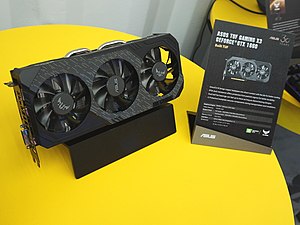 Nvidia GeForce GTX 1660 ASUS TUF Gaming X3 | |
| Release date | February 22, 2019 |
|---|---|
| Discontinued | March 5, 2024[1] |
| Manufactured by | TSMC |
| Designed by | Nvidia |
| Marketed by | Nvidia |
| Codename | TU11x |
| Architecture | Turing |
| Models | GeForce GTX series |
| Transistors |
|
| Fabrication process | TSMC 12 nm (FinFET) |
| Cards | |
| Entry-level |
|
| Mid-range |
|
| API support | |
| DirectX | Direct3D 12.0 (feature level 12_1) Shader Model 6.7 |
| OpenCL | OpenCL 3.0[2][a] |
| OpenGL | OpenGL 4.6[3] |
| Vulkan | |
| History | |
| Predecessor | GeForce 10 series |
| Variant | GeForce 20 series |
| Successor | GeForce 30 series |
| Support status | |
| Supported | |
The GeForce 16 series is a series of graphics processing units (GPUs) developed by Nvidia, based on the Turing microarchitecture, announced in February 2019.[5] The 16 series, commercialized within the same timeframe as the 20 series, aims to cover the entry-level to mid-range market, not addressed by the latter. As a result, the media have mainly compared it to AMD's Radeon RX 500 series of GPUs.
The GeForce 16 series includes the GTX 1650, 1650 Super, 1660, 1660 Super, 1660 Ti, and a lower-end GTX 1630, which was released later. The GTX 1650 features both a GDDR5 and GDDR6 version.
Like the GeForce 20 series, the GeForce 16 series was followed by the GeForce 30 series. The 16 series was the last GPU generation of the GeForce series that did not support hardware-accelerated real-time ray tracing and was therefore marketed under the GTX prefix.
- ^ "NVIDIA discontinues GeForce GTX 16 GPUs, the end of GTX series". VideoCardz. March 5, 2024. Retrieved March 5, 2024.
- ^ "OpenCL Driver Support | NVIDIA Developer". developer.nvidia.com. NVIDIA. April 24, 2013. Retrieved May 30, 2022.
- ^ "OpenGL Driver Support | NVIDIA Developer". developer.nvidia.com. NVIDIA. August 19, 2013. Retrieved May 30, 2022.
- ^ "Vulkan Driver Support | NVIDIA Developer". developer.nvidia.com. NVIDIA. February 10, 2016. Retrieved May 30, 2022.
- ^ "New GeForce GTX 1660 Ti Delivers Great Performance Leap for Every Gamer, Starting at $279 | NVIDIA Newsroom". nvidianews.nvidia.com. NVIDIA. February 22, 2019. Retrieved October 22, 2019.
Cite error: There are <ref group=lower-alpha> tags or {{efn}} templates on this page, but the references will not show without a {{reflist|group=lower-alpha}} template or {{notelist}} template (see the help page).